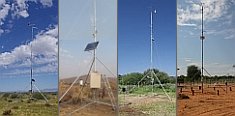Workpackages of Subproject S06
Workpackage WP06.1
Prof. Norbert Jürgens, Biocentre Klein Flottbek & Botanical Garden, University of Hamburg, Germany
juergens@botanik.uni-hamburg.de
Monitoring of phytodiversity and vegetation dynamics
Short description: The main aim of this work package is to get insight into the vegetation dynamics and changes in phytodiversity due to the impact of climate change and human land-use. For this purpose, monitoring will be conducted on three different scales: regional patterns (vegetation changes along the BIOTA transect, compare S01.1 and S01.4, local patterns (vegetation changes on different phytocenoeses on Biodiversity Observatories) and population scale (individual-based monitoring on Biodiversity Observatories).
Work package leaders: Dr. Karen Esler (University of Stellenbosch), Prof. Norbert Jürgens (University of Hamburg), Dr. Richard Knight (University of the Western Cape), Dr. Connie Krug (University of Stellenbosch), Prof. Sue Milton (University of Stellenbosch), Dr. Ute Schmiedel (University of Hamburg), Mr. Ben Strohbach (National Botanical Research Institute)
Workpackage WP06.2
Prof M Timm Hoffman, Director: Leslie Hill Institute for Plant Conservation, Botany Department, University of Cape Town, Private Bag, Rondebosch 7701, South Africa
thoffman@botzoo.uct.ac.za
http://www.uct.ac.za/depts/ipc
Reconstruction of recent history of vegetation and land use
Short description: Using a wide array of techniques (including vegetation surveys, repeat ground and aerial photography, remote sensing and traveller's records), the environmental history of Namaqualand over the last 100 years is investigated. Population changes in key indicator species (such as Aloe dichotoma) and historical changes in land use practices are documented. The predictions of recent climate change models for Namaqualand are also evaluated in the light of historical changes in the region. A properly archived and digitally-available collection of historical photographs is a secondary goal of this sub-project.
Work package leaders: Prof. Timm Hoffman (University of Cape Town), Prof. Norbert Jürgens (University of Hamburg), Mr. Ben Strohbach (National Botanical Research Institute)
Workpackage WP06.3
Prof. Gretel van Rooyen, Department of Botany, University of Pretoria, Pretoria 0002, South Africa
gretel.vanrooyen@up.ac.za
Analysing plant functional traits along environmental gradients within and between different biomes
Short description: The aim of this work package is to complement the floristically-based vegetation analyses of the other work packages (S06.1 & S06.5) with a functional analysis of the vegetation. Such a functional approach is of paramount importance to understand the functioning of ecological systems and to predict vegetation responses to climate-driven and human-induced changes. To achieve this aim the values and ranges of functional traits and consequently functional types, will be analysed along topographical, climate and land-use gradients.
Work package leaders: Dr. Karen Esler (University of Stellenbosch), Prof. Norbert Jürgens (University of Hamburg), Dr. Connie Krug (University of Stellenbosch), Prof. Peter Poschlod (University of Regensburg), Dr. Ute Schmiedel (University of Hamburg), Prof. Gretel van Rooyen (University of Pretoria)
Workpackage WP06.4
Dr. Charles F Musil, National Botanical Institute, Private Bag X7, Claremont 7735, South Africa
Musil@nbi.ac.za
Direkt impact of global climate change on plants - an experimental approach
Short description:
Workpackage WP06.5
Prof. Norbert Jürgens, Biocentre Klein Flottbek & Botanical Garden, University of Hamburg, Germany
juergens@botanik.uni-hamburg.de
Towards sustainable use: Impact of different human land use types on phytodiversity, its ecosystem function and resilience
Short description: The impact of human land use will be studied along topographical and land-use gradients within a landscape and in fence line contrasts:
- by analysing land-use contrasts and disturbance gradients in terms of phytodiversity, vegetation dynamics, ecosystem function and rangeland resilience
- by analysing enclosure plots in order to examine directly the effects of grazing / browsing on the vegetation
- by conducting biomass assessments (compare WP S01.1)
Work package leaders: Dr. Karen Esler (University of Stellenbosch), Prof. Norbert Jürgens (University of Hamburg), Dr. Richard Knight (University of the Western Cape), Dr. Connie Krug (University of Stellenbosch), Dr. Ute Schmiedel (University of Hamburg), Mr. Ben Strohbach (National Botanical Research Institute), Prof. Gretel van Rooyen (University of Pretoria), Mr. Ibo Zimmermann (Polytechnic of Namibia)
Workpackage WP06.6
Prof. Norbert Jürgens, Biocentre Klein Flottbek & Botanical Garden, University of Hamburg, Germany
juergens@botanik.uni-hamburg.de
Potential and techniques for the rehabilitation of degraded biodiversity
Short description: The general approach of this work package aims at a systematic evaluation of all ecosystem components and processes which are of potential value for rehabilitation and/or restoration of degraded systems and their biodiversity. This work package contains a number of different approaches to rehabilitate landscapes with degraded biodiversity:
- Restoration of bare patches in the Thornbush Savanna
- Transplanting on rangelands and abandoned fields infested by invasive Atriplex species in the Namaqualand
- Analysis of existing experiences of rehabilitation techniques in the Namaqualand
- Pilot experiments on the conditions of natural rejuvenation of degraded rangeland vegetation
Work package leaders: Dr. Nicky Allsopp (University of the Western Cape), Mr Albertus Dyason (North West Agricultural Development Centre), Prof. Norbert Jürgens (University of Hamburg), Dr. Ute Schmiedel (University of Hamburg), Mrs. Marianne Strohbach (National Botanical Research Institute)
|






 Go to the WeatherNet
Go to the WeatherNet